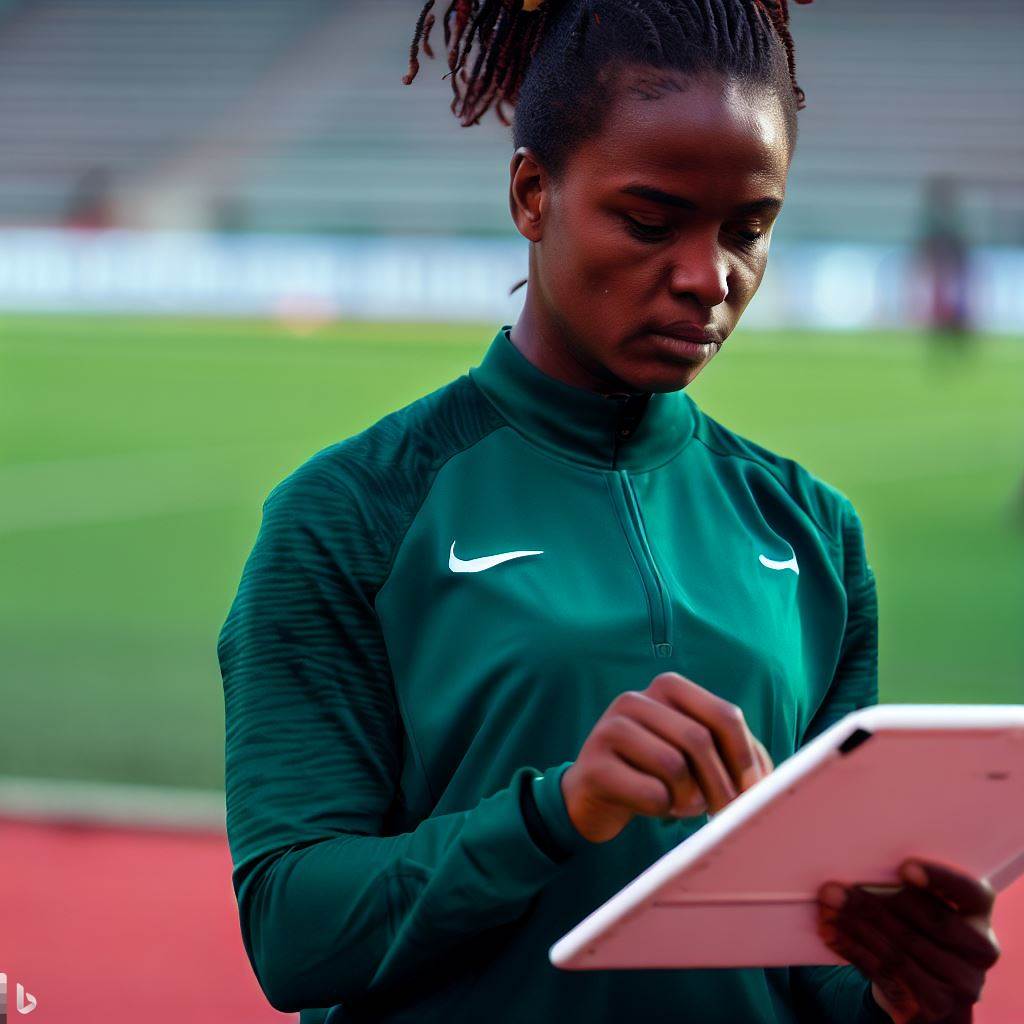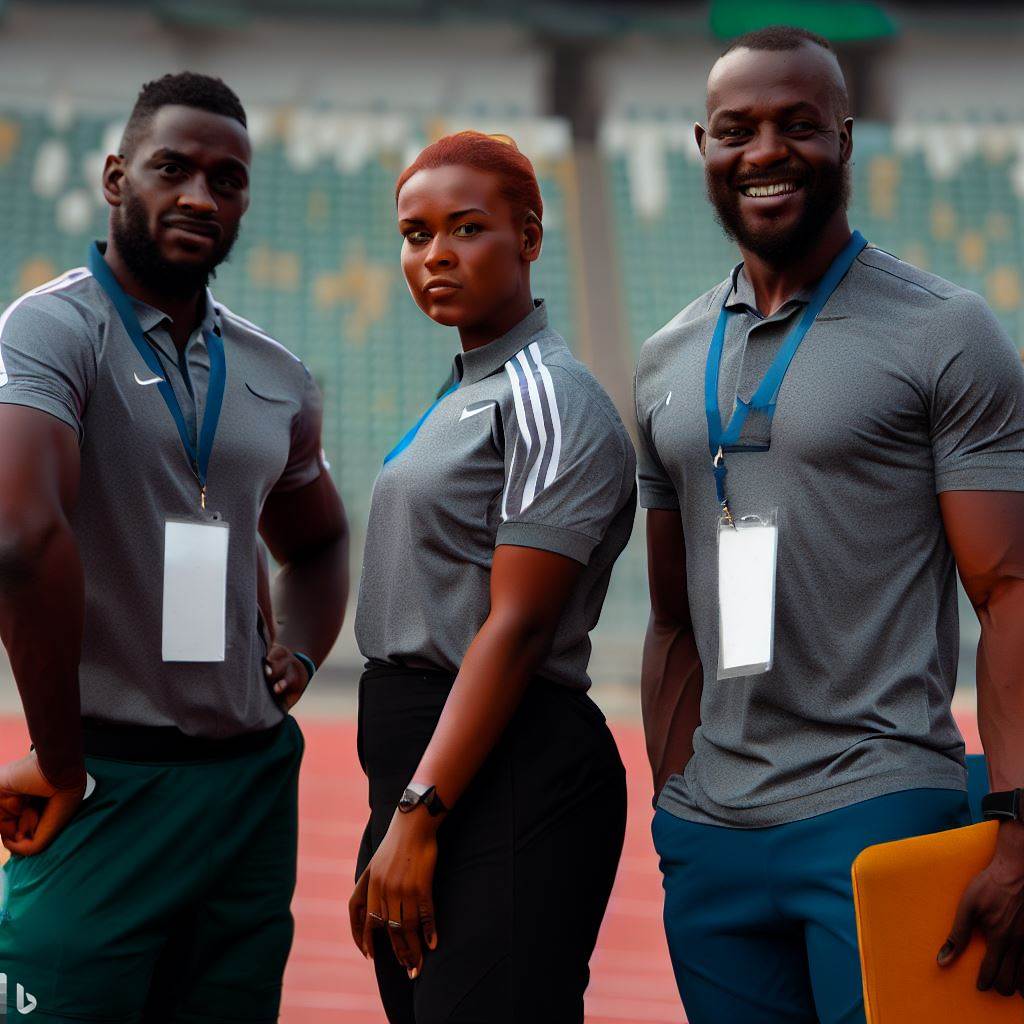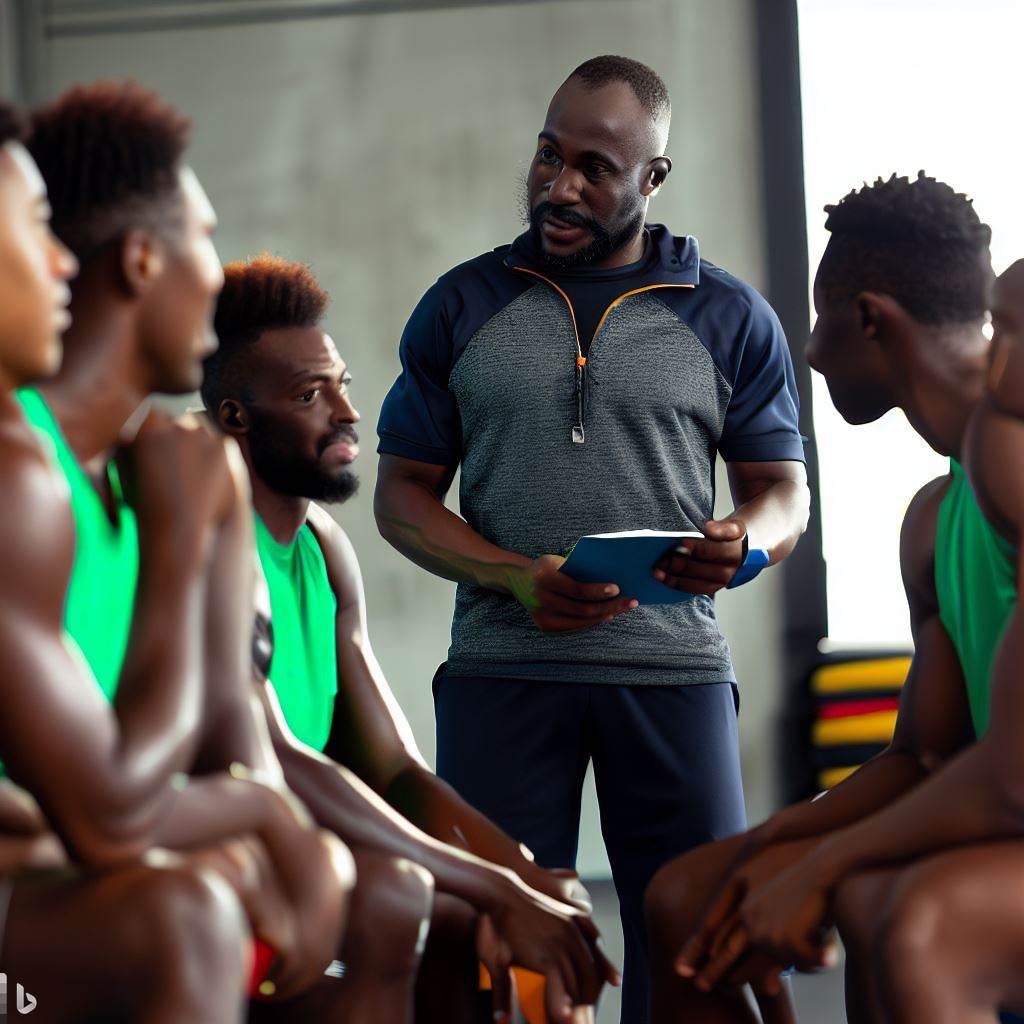Introduction
Assistant coaching in Nigeria has grown in importance and relevance over the years.
Thesis statement
Technology has revolutionized assistant coaching in Nigeria, bringing about significant changes and advancements in various aspects.
Technology has become an integral part of assistant coaching in Nigeria, transforming the way coaches and players interact.
Through the use of video analysis software, coaches are able to analyze players’ performances and provide detailed feedback.
Additionally, the introduction of wearable technology has allowed coaches to monitor players’ physical performance in real-time.
Furthermore, the availability of online training platforms has enabled assistant coaches to access a wide range of educational materials and resources.
With the help of technology, assistant coaches can now easily communicate with players and other coaching staff, regardless of distance.
Technology has also enhanced the scouting process, allowing coaches to discover and recruit talented players from different parts of Nigeria.
Moreover, virtual reality and simulation technology have provided assistant coaches with innovative methods for training and tactical analysis.
Most importantly, technology has played a crucial role in transforming assistant coaching in Nigeria.
It has revolutionized communication, analysis, training, and scouting, leading to a more efficient and effective coaching process.
Traditional Methods of Assistant Coaching in Nigeria
Description of traditional coaching techniques
The traditional methods of assistant coaching in Nigeria are often characterized by a hierarchical structure, where the coach holds complete authority and makes all decisions without much input from the assistant coach.
The assistant coach typically functions as a subordinate, following the instructions given by the head coach.
Limitations of traditional methods
- The lack of autonomy for the assistant coach limits their ability to contribute innovative ideas and strategies to the team.
- Communication between the head coach and assistant coach is often one-way, with the assistant coach receiving instructions but lacking the opportunity to provide feedback or ask questions.
- The traditional methods do not encourage active collaboration between the coaching staff, leading to a missed opportunity for collective problem-solving and growth.
- The dependency on a single coach’s perspective may result in a narrow approach to coaching, limiting the team’s potential for improvement.
- Assistant coaches may feel marginalized and less motivated due to the limited authority and lack of opportunities for professional growth.
Need for innovative approaches to improve coaching effectiveness
- Integrating technology into assistant coaching can revolutionize the way coaching is done in Nigeria.
- Video analysis tools can be used to review game footage and identify areas for improvement, enabling assistant coaches to provide valuable insights to the head coach.
- Communication platforms can facilitate real-time collaboration between the coaching staff, allowing for discussions, brainstorming, and sharing of ideas.
- Data analytics can provide objective feedback on player performance and team dynamics, offering assistant coaches a more comprehensive understanding of the team’s strengths and weaknesses.
- Virtual reality simulations can provide assistant coaches with an immersive training experience, enhancing their skills and knowledge.
- Online resources and courses can be utilized to continuously develop the expertise of assistant coaches, ensuring they stay up-to-date with the latest coaching techniques.
- Creating a culture of trust and open communication within the coaching staff can foster a supportive environment for innovation and growth.
- Encouraging assistant coaches to take on more responsibilities and empowering them to make decisions can enhance their motivation and job satisfaction.
- Mentorship programs can connect experienced coaches with assistant coaches, providing guidance and support in their professional development.
- Investing in the professional development of assistant coaches can lead to a more effective coaching team and ultimately improve the performance of Nigerian teams.
Read: Women in Assistant Coaching Roles in Nigeria
Emergence of Technology in Assistant Coaching
Introduction of technology in Nigeria’s coaching landscape
The role of technology in assistant coaching in Nigeria has been rapidly growing in recent years.
With advancements in technology, coaches are now utilizing various tools and software to enhance their training sessions and improve player development.
This introduction of technology has revolutionized the way coaching is conducted in the country.
Examples of technologically-driven coaching tools
1. Video analysis software
Video analysis software has become an integral part of assistant coaching in Nigeria.
Coaches use this tool to analyze game footage, individual player performances, and team tactics.
The software allows coaches to break down videos, draw on screen, and provide detailed feedback to the players.
2. Wearable devices
Another technological advancement that has made an impact in assistant coaching is the use of wearable devices.
These devices, such as fitness trackers and heart rate monitors, provide valuable data on players’ physical performance during training sessions and matches.
Coaches can track players’ heart rates, distances covered, and even analyze their sleep patterns to optimize their training programs.
3. Virtual reality simulations
Virtual reality simulations have also gained popularity among assistant coaches in Nigeria.
This immersive technology allows players to experience realistic training scenarios in a virtual environment.
Coaches can create specific game situations and put players through virtual drills to enhance decision-making, spatial awareness, and overall game understanding.
The emergence of these technologically-driven coaching tools has had a profound impact on assistant coaching in Nigeria.
Coaches now have access to data, analysis, and simulations, which were previously unavailable, allowing for more effective training sessions and player development.
The use of video analysis software has significantly improved the tactical understanding of players.
Coaches can now pause, rewind, and analyze specific moments in a game, allowing players to recognize their mistakes and make improvements.
This level of analysis has led to more strategic gameplay and better overall team performance.
Wearable devices have introduced a new level of individualized training in assistant coaching.
Coaches can now track players’ fitness levels, ensure they are reaching optimal performance levels, and tailor training programs accordingly.
This data-driven approach has led to more efficient training sessions and decreased the risk of injuries.
Virtual reality simulations have added an exciting dimension to assistant coaching.
Players can experience high-intensity training sessions and game scenarios without physical strain.
Coaches can create realistic environments that challenge players’ decision-making abilities, improving their mental preparedness for actual matches.
In general, technology has played a significant role in the evolution of assistant coaching in Nigeria.
The introduction of video analysis software, wearable devices, and virtual reality simulations has revolutionized the way coaches approach training and player development.
These technologically-driven tools have enhanced tactical understanding, personalized training programs, and provided realistic training scenarios.
As technology continues to advance, the role of technology in assistant coaching will only continue to grow, ultimately benefiting both coaches and players in Nigeria’s coaching landscape.
Read: Building a Brand: Assistant Athletic Trainers in Nigeria
Advantages of Technology in Assistant Coaching
A key factor in the success of assistant coaching is the integration of technology into various coaching practices.
This section explores the advantages that technology brings to assistant coaching in Nigeria.
Enhanced player assessment and performance analysis
Technology plays a crucial role in enhancing player assessment and performance analysis for assistant coaches in Nigeria.
Through the use of advanced tools and software, coaches can collect and analyze data to gain valuable insights into player performance.
By tracking important metrics such as player speed, agility, and accuracy, coaches can assess individual strengths and weaknesses.
This allows for personalized training plans tailored to each player’s specific needs, maximizing their potential on the field.
Furthermore, technology enables real-time performance analysis during practice sessions and matches.
Coaches can use video analysis software to review player performance, identify areas of improvement, and provide constructive feedback.
This immediate feedback loop enhances learning and development for players.
Improved training programs through data-driven insights
With the help of technology, assistant coaches in Nigeria can create more effective training programs.
By using data-driven insights, coaches can identify patterns, trends, and correlations that may not be evident through subjective observation alone.
For example, by analyzing player performance data, coaches can determine the correct balance between physical training, tactical drills, and mental preparation.
They can identify which areas need more focus and adjust training programs accordingly.
Moreover, the use of wearable tracking devices allows coaches to monitor players’ exertion levels and recovery rates.
This data helps in preventing injuries and optimizing training schedules.
Increased accessibility and convenience for coaches and players
Technology has greatly improved accessibility and convenience for assistant coaches and players in Nigeria.
Through online platforms and mobile applications, coaches can easily communicate with players, share training materials, and provide feedback.
Virtual meetings and webinars enable coaches and players to connect remotely, ensuring that coaching sessions can still take place regardless of location or travel constraints.
This level of accessibility and convenience fosters continuous learning and development for both coaches and players.
Integration of sports science into coaching practices
Technology has enabled the integration of sports science into assistant coaching practices in Nigeria.
Coaches can access a wealth of information related to sports nutrition, injury prevention, and recovery techniques.
By incorporating sports science principles into their coaching, assistants can maximize the physical and mental well-being of their players.
They can make informed decisions regarding training intensity, rest periods, and recovery strategies, ultimately leading to improved performance and reduced risk of injuries.
In essence, the advantages of technology in assistant coaching in Nigeria are significant.
From enhanced player assessment to improved training programs through data-driven insights, technology plays a crucial role in the success of assistant coaching.
Additionally, the increased accessibility and convenience for coaches and players, as well as the integration of sports science practices, further enhance the quality of coaching and development in Nigeria’s sporting landscape.
Read: Ethics in Sports Journalism: A Guide for Nigerian Professionals

Challenges and Implications of Technology in Assistant Coaching
Overcoming Implementation Barriers
- Lack of technical expertise and training can hinder the successful implementation of technology in coaching.
- Resistance to change from coaches and athletes who prefer traditional methods may pose challenges.
- Limited financial resources may restrict the acquisition and maintenance of advanced coaching technologies.
Privacy and Ethical Concerns in Data Collection
- Collecting and storing personal data of athletes raises privacy concerns and requires strict data protection measures.
- Coaches must ensure that the data collected is used ethically and solely for coaching purposes.
- Implementing robust security measures is essential to prevent unauthorized access to sensitive information.
Digital Divide and Accessibility Issues in Nigeria
- Access to reliable internet connectivity in all areas of Nigeria is essential for technology-driven coaching.
- The rural population may face challenges in accessing and utilizing technology due to infrastructure limitations.
- The cost of devices and internet services can make technology inaccessible for economically disadvantaged coaches and athletes.
Balancing Technology with Human Coaching Expertise
- While technology can enhance coaching effectiveness, it should not replace the importance of human expertise.
- Coaches must strike a balance between utilizing technology tools and maintaining personal connections with athletes.
- Over-reliance on technology may hinder the development of critical thinking and decision-making skills in coaches.
Basically, the implementation of technology in assistant coaching in Nigeria brings forth various challenges and implications.
Overcoming barriers to implementation, addressing privacy and ethical concerns, bridging the digital divide, and balancing technology with human expertise are key considerations.
By navigating these challenges, technology can be effectively leveraged to enhance coaching methodologies and elevate the performance of Nigerian athletes.
Read: How to Start a Career in Sports Journalism in Nigeria
Success Stories and Case Studies
These are just a few examples of how Nigerian coaches have effectively employed technology in their coaching methodologies.
The impact of such technological advancements on athlete development and performance cannot be overstated.
By harnessing the power of video analysis software, coaches are able to dissect game footage to analyze individual and team performance, identify patterns and trends, and make informed decisions regarding tactics and strategy.
This level of analysis and feedback helps athletes understand their strengths and weaknesses, allowing them to focus on areas that require improvement.
In addition to video analysis, the use of fitness tracking devices has revolutionized athlete training and injury prevention.
These devices provide real-time data on an athlete’s heart rate, distance covered, speed, and more.
Coaches can use this information to monitor workloads, track progress, and identify any signs of overtraining or potential injury risks.
Virtual reality training simulations are another technological tool that assistant coaches have successfully employed.
These simulations allow athletes to experience realistic game scenarios and make decisions in a controlled environment, honing their cognitive skills and improving on-field decision-making abilities.
These success stories and case studies highlight the transformative role of technology in assistant coaching in Nigeria.
They serve as a testament to how technology has become an integral part of athlete development and performance improvement.
Future Trends and Possibilities
Predictions for future advancements in coaching technology
- Enhanced data analytics will enable coaches to gain deeper insights into player performance.
- Virtual reality technology will provide immersive training experiences for both coaches and players.
- Increased connectivity will allow for real-time collaboration and communication between coaches and athletes.
- Wearable technology will continue to evolve, providing coaches with more accurate and detailed player data.
- Video analysis tools will become more advanced, allowing coaches to analyze games and provide personalized feedback.
Potential applications of Artificial Intelligence and Machine Learning
- AI-powered coaching assistants can analyze large amounts of data to identify patterns and make data-driven recommendations.
- Machine learning algorithms can help coaches predict player performance and identify areas for improvement.
- AI chatbots can provide instant coaching advice and support to both coaches and players.
- Virtual coaches powered by AI can simulate game scenarios and offer training simulations for player development.
- AI can assist with scouting and talent identification, streamlining the player recruitment process.
Importance of adapting to technological changes for coaching development
- Coaches need to stay updated with the latest technology trends to remain competitive in the coaching industry.
- Embracing technology can enhance coaching efficiency, allowing coaches to focus more on player development.
- Technological advancements can help bridge the gap between coaching and scientific research, leading to better training methodologies.
- Utilizing technology can improve communication and collaboration among coaching staff and players.
- Coaches who adapt to technological changes can gain a competitive edge in talent recruitment and player development.
Overall, the future of assistant coaching in Nigeria is bright with the potential advancements in technology.
Coaches can look forward to utilizing enhanced data analytics, virtual reality training, wearable technology, and advanced video analysis tools to improve player performance.
Artificial intelligence and machine learning offer exciting possibilities, from AI-powered coaching assistants to virtual coaches.
Publish Your Professional Profile, Business or Brand
Showcase your expertise, gain trust, and boost visibility instantly on Professions.ng.
Publish NowIt is crucial for coaches to stay updated with technological changes and adapt to them to enhance coaching efficiency, communication, and talent identification.
By embracing technology, coaches can elevate their coaching development and propel Nigerian athletes to new heights.
Conclusion
In summary, technology has played a crucial role in assistant coaching in Nigeria.
It has revolutionized coaching practices and brought about significant improvements in training methods and performance analysis.
The ongoing integration and utilization of technology in coaching practices cannot be overstated.
It has become an indispensable tool that enhances communication, data analysis, and player development.
However, there is still a need for continued research and investment in technology for coaching improvement.
As advancements in technology continue to emerge, coaches must stay updated and adapt to new tools and techniques to remain effective in their role.
Overall, technology has proven to be a game-changer in Nigerian assistant coaching, and its impact will only continue to grow.
As coaches embrace and leverage technology, they can expect to see further advancements and improvements in training and performance outcomes.




